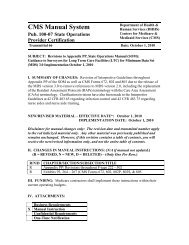LOUISIANA Community Mental Health Services Block Grant ...
LOUISIANA Community Mental Health Services Block Grant ...
LOUISIANA Community Mental Health Services Block Grant ...
Create successful ePaper yourself
Turn your PDF publications into a flip-book with our unique Google optimized e-Paper software.
Both private and public agencies are members of these organizations. The programs provide<br />
outreach and/or shelter and housing services to the homeless, as well as substance abuse and mental<br />
health services. <strong>Services</strong> targeted to the elderly, children, youth and their families who are<br />
homeless have been generally limited in the past, however, there have been strides to identify and<br />
improve a number of service gaps for children and youth who are homeless across the state.<br />
For the federal PATH funding, Louisiana relies on in-kind and contractual contributions as its<br />
federal match. For FY 10 the match amount is $499,083.00. Virtually all of the PATH service<br />
providers are part of the local Continuum of Care systems for the homeless. As a part of the<br />
planning process, these coalitions participate and facilitate public hearings to request comment on<br />
the current use of funding to put an end to homelessness, and provide opportunities for public<br />
comment.<br />
Louisiana Road Home Recovery Plan<br />
The Louisiana Road Home Recovery Plan, an initiative of the Louisiana Recovery Authority (LRA)<br />
has included the rebuilding of affordable housing in the areas most impacted by Hurricanes Katrina,<br />
Rita, Gustav and Ike. This is being accomplished through a system of funding incentives that<br />
encourage the creation of mixed income housing developments. This plan targets not only the<br />
metropolitan areas impacted by the hurricanes but also several of the rural parishes that were more<br />
impacted by hurricane Rita. Included in this plan is the use of Permanent Supportive Housing as a<br />
model for housing and supports for people with special needs, such as people with disabilities, older<br />
people with support needs, families with children/youth who have disabilities and youth aging out<br />
of foster care. It is a model that provides for housing that is fully integrated into the community.<br />
The model does this through setting aside a percentage of housing units within each housing<br />
development built to be used for persons in special population categories, and includes support<br />
services that are delivered in the individual‟s (or family‟s) home. Adults with SMI and families of<br />
children with emotional/behavioral disorders, and the frail elderly are included within the identified<br />
special needs population targeted for the supportive housing set aside units. The services to be<br />
delivered to persons/families in the target population will be those services likely to help them<br />
maintain housing stability.<br />
Taken together, the deficits in affordable housing and the drastic increase in the cost of living in<br />
many areas of the state have generated a homeless crisis. The homeless crisis disproportionately<br />
affects the chronically mentally ill, most of whom are on a fixed budget and lack support systems.<br />
Particularly in urban areas, thousands of people inhabit abandoned homes, nearly 500 people fill the<br />
emergency shelters every night, and there are countless numbers of individuals living from „pillow<br />
to post‟ and on the street. It is noted that HUD does not consider people who are in shelters,<br />
supportive housing and FEMA housing as “homeless” and therefore numbers that include people<br />
who are displaced from their homes are not technically „homeless‟ and these numbers are actually<br />
much greater than reflected in the HUD counts.<br />
Homeless Coalition<br />
There are multiple providers of homeless programs in each area of the state. Each Region / LGE<br />
has a Homeless Coalition, an organization that addresses systems issues and coordinates services<br />
for the homeless. The Regional Homeless Coalitions incorporate a complete continuum of care for<br />
homeless clients from outreach services to placement in permanent housing. Both private and<br />
public agencies are members of these organizations. The programs provide outreach and/or shelter<br />
and housing services to the homeless, as well as substance abuse and mental health services.<br />
PART C <strong>LOUISIANA</strong> FY 2011 PAGE 255<br />
SECTION III: CHILD/YOUTH PLAN – CRITERION 4<br />
TARGETED SERVICES TO RURAL & HOMELESS POPULATIONS – OUTREACH TO HOMELESS
















